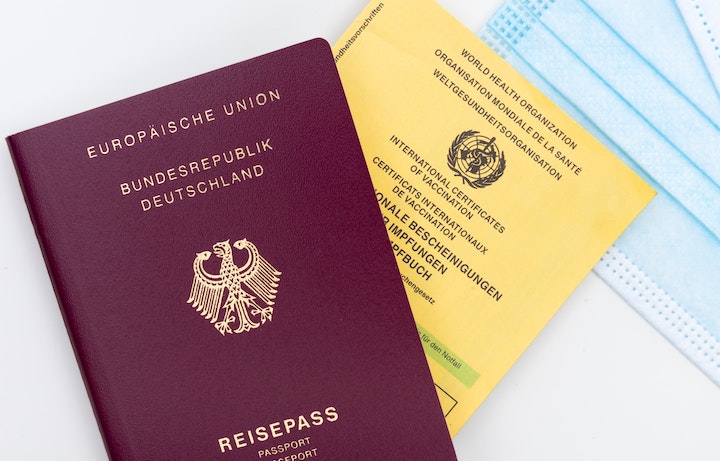Planning and relocating to a new country can be quite challenging and complex. People who decide to do everything on their own are at higher risk of facing problems during the immigration process.
If you want to ensure your journey toward a job offer in Germany goes smoothly, we’re here to help. In this article, we will walk you through the most important aspects of searching for jobs and moving to Germany.
Let’s get started!
Researching and Understanding the German Labour Market
Before embarking on your journey to Germany, it is crucial to research the labour market to identify the most promising industries and sectors for your skills and professional qualifications.
The German economy is known for its strength in various fields, including engineering, manufacturing, technology, and finance. You can use online job portals, professional networks, and job fairs to explore opportunities and connect with potential employers.
Working In Germany with Robin
Job hunting is way easier when you have professional recruiters by your side. That’s why more than 40,000 people from different EU countries collaborated with Robin to find a new job!
And you can do it too, completely free of charge. Our goal is to match skilled workers like you with employment agencies in Germany, Belgium, and the Netherlands. Here is how it works.
You register on our website and fill out information about yourself and your previous work experience. We have job opportunities for experienced workers and people who are just starting. Based on your profile, we show you the best match vacancies. You have some time to see the job description and consider the offer; if you accept it, our recruiter will contact you for further information and the necessary steps.
One of the most significant advantages of finding a specific job with Robin is that you work with a recruiter from your country who speaks your mother tongue. This makes the entire process easier and less stressful.
On top of that, our team is more than happy to assist you in creating your CV and other arrangements necessary for your relocation to Germany. They work with numerous job seekers like you and know all the details necessary for a smooth transition.
If you want to ensure your position in one of many reliable German companies, register on our website and let us guide you through! Only EU citizens are eligible to apply.

Essential Travel Documents and Legalities
Necessary Residence Permits and Visas
You don’t need to get a residence permit or work visa if you are from the EU. But if you’re not, obtaining a German residence permit and work visa is critical in your journey to becoming a foreign worker in Germany. Depending on your circumstances, you may need to apply for your visa at a German embassy or consulate of the German authorities in your home country.
The processing time can vary, so plan accordingly and gather all required documents, such as proof of employment, academic qualifications, and valid travel insurance.
When you enter Germany, you must register your address at the local registration office (Einwohnermeldeamt) within a specific timeframe.
This registration is mandatory even for EU workers, and you will receive a registration certificate (Anmeldebestätigung), which is essential for various administrative processes.
After registering, you will need to apply for a residence permit (Aufenthaltstitel) at the local Foreigners’ Registration Office (Ausländerbehörde). The residence permit will specify the duration and conditions of your stay in Germany.
Navigating Work Permits and Visa Requirements
If you’re coming from a country that isn’t a member of the EU, you will typically need a work permit and the appropriate visa to work in Germany. The process can vary based on your nationality, qualifications, and the nature of your employment.
Germany offers different types of work permits, including the European Union Blue Card for highly qualified non-EU citizens and general work permits for specific occupations. Ensure you understand the specific requirements of your situation and start the application process well in advance.

EU Blue Card
The EU Blue Card, also known as a skilled worker visa, is a work and residence permit that allows highly skilled non-EU/EEA nationals to live and work in any EU country (except Ireland and Denmark) for a specified period. It was introduced by the European Union to attract and retain highly qualified professionals from around the world, addressing skill shortages in various industries.
Tax and Social Security Obligations
As a foreign worker in Germany, you will be subject to the country’s tax and social security systems. Familiarise yourself with the tax laws and regulations and any tax treaties that may apply to your situation.
On top of that, ensure that you are aware of your obligations regarding health insurance, pension contributions, and other social security benefits. Seeking the advice of a tax professional can help you navigate the complexities of the German tax system.

Accommodation
Germany offers a variety of housing options, ranging from apartments in urban centres to charming houses in the countryside. One of the key things to know is that the rental market in major German cities can be highly competitive, especially in popular areas.
If you don’t work with Robin, it is advisable to start your search early and be prepared to provide the necessary documents and proof of income to secure a rental property. Also, many landlords and property managers may require a SCHUFA (Schutzgemeinschaft für allgemeine Kreditsicherung) credit report, so it’s a good idea to obtain one beforehand.
Renting an apartment is the most common choice for expats in Germany. It’s essential to consider the cost of living in your desired location, as rental prices can vary significantly across different cities and neighbourhoods. While larger cities like Berlin, Munich, and Hamburg might have higher rent prices, smaller towns and cities often offer more affordable options.
When searching for accommodation, familiarise yourself with standard rental terms used in German contracts, as many landlords will provide contracts in German. It’s essential to review the terms and conditions carefully before signing. Also, consider seeking legal advice if needed.
Easier Way to Ensure Accommodation
You don’t have to do research online and learn German words to ensure suitable accommodation. There is an easier way.
If you start working with Robin, you will ensure accommodation and a job position in Germany. You don’t have to use your time and energy for that; professionals will help you.
It’s not only easier, but also cheaper! Usually, accommodation costs per week are between €100 and €135. In contrast, the average cost of accommodation in Germany is around €200 per week..
It’s important to set your expectations realistically. Getting an accommodation through an employment agency may also have some challenges, including fewer options. Employment agencies are trying to find housing that is closest to employers’ workplaces.
On top of that, these accommodations are usually shared with other foreign workers, so it can be less private than finding a place on your own. But if you’re going with family members, friends, or partners, the agency can guarantee you will be accommodated together.

Working Culture
One of the prominent aspects of German work culture is the value placed on professionalism and formal communication. Germans tend to be direct and straightforward in their interactions, so your communication style must be clear and concise.
Punctuality is highly regarded in Germany, both in professional and social settings. Arriving on time for meetings, appointments, and work-related events is crucial. Planning your daily schedule with ample time for transportation and unforeseen delays is a good practice to maintain.
The concept of work-life balance is taken seriously in Germany. While Germans are known for their strong work ethic, they value time spent with family and leisure activities. The standard working hours are typically around 40 hours per week, and the weekends are considered personal time for relaxation and socialising.
In the workplace, teamwork and collaboration are highly encouraged, and decision-making processes often involve consensus-building. It is important to be respectful of your colleagues’ opinions and contribute constructively to discussions.
Germany also places a strong emphasis on continuous learning and professional development. Employers often support employees’ further education and training to enhance their skills and expertise. Taking advantage of such opportunities can not only contribute to your personal growth but also demonstrate your commitment to your career.
Language
One of the biggest concerns foreign workers face is language barriers. You have nothing to worry about if you have at least a B1 level of English. On Robin’s website, you can find plenty of vacancies in different departments that require only English knowledge.
If you can communicate in German or Dutch, your options are even more extensive! The majority of German companies welcome skilled workers with knowledge of these languages.
In case you still don’t have enough language knowledge, don’t worry. Finding a job is a bit harder, but it is still manageable. One solution is to relocate with a friend or partner with a sufficient skill level for communication and then take time to learn.
Health Insurance and Healthcare
One of the essential aspects of living and working in Germany is ensuring you have adequate health insurance coverage.
Germany boasts a high-quality healthcare system that provides comprehensive medical services to its residents. As a foreign worker, you have several options for health insurance, depending on your employment status and income.
Statutory Health Insurance (Gesetzliche Krankenversicherung – GKV)
If your gross annual income is below a certain threshold (e.g., €64,350 in 2021), you are generally required to join the statutory health insurance scheme.
Under this system, both you and your employer will contribute a percentage of your gross income towards your health insurance.
Private Health Insurance (Private Krankenversicherung – PKV)
If your income exceeds the statutory health insurance threshold or you are self-employed, you can choose private health insurance. Private insurance plans often offer more extensive coverage and additional benefits, but they can also be more expensive.
Overview of the German Healthcare System and Accessing Medical Services
Germany’s healthcare system is renowned for its efficiency and accessibility. It comprises a network of hospitals, clinics, and private practitioners who provide top-notch medical care.
As a foreign worker, you can access the same healthcare services as German citizens once you are properly insured.
To avail of medical services, you must select a primary care physician (Hausarzt), who acts as a gatekeeper for non-emergency medical needs. Your primary care physician will refer you to specialists or hospitals for further treatment, if necessary.
You can call the nationwide emergency number 112 for immediate medical assistance. It’s also essential to familiarise yourself with the location of nearby hospitals and medical facilities in your area.
Salary
The German job market is known for offering competitive salaries and excellent working conditions. Salaries in Germany can vary significantly depending on factors such as the industry, job position, qualifications, and work experience.
The current minimum wage in Germany is €12 gross per hour, or approximately €1917 gross per month. According to The Federal Statistical Office, the average monthly salary for a full-time employee in Germany is €4,105 (gross). That’s an annual gross salary of €49,260.
Even the minimum salary in Germany can provide you with a comfortable standard of living, allowing you to enjoy the country’s high-quality healthcare, education, and social services. Your living costs will vary depending on the city where you live and your lifestyle, but overall, the minimum wage is enough to cover them.
Final Thoughts
We hope you are one step closer to your dream life in Germany after reading this article.
If you are ready to live and work in Germany, register on our website, and we will support you every step of the way!

 English
English  Lietuvių
Lietuvių  Latviešu
Latviešu  Polski
Polski  Português
Português  Română
Română  Slovenčina
Slovenčina  Magyar
Magyar  Русский
Русский  Espanol
Espanol  България
България  Čeština
Čeština  Italy
Italy  Croatia
Croatia  Greek
Greek 

